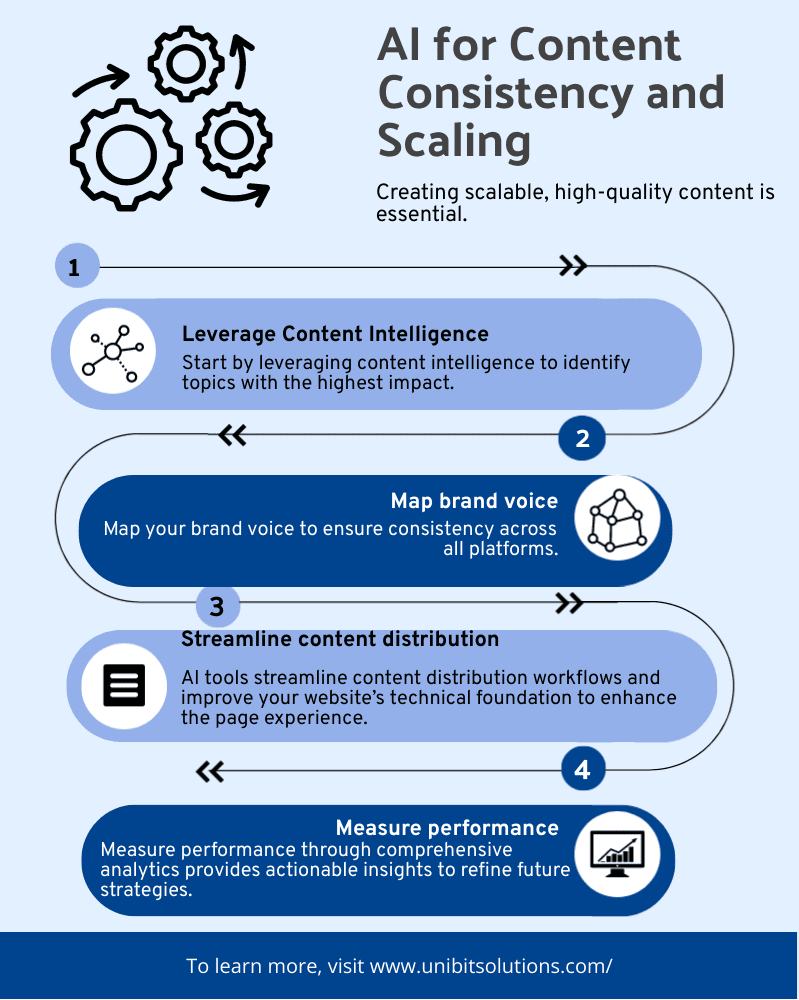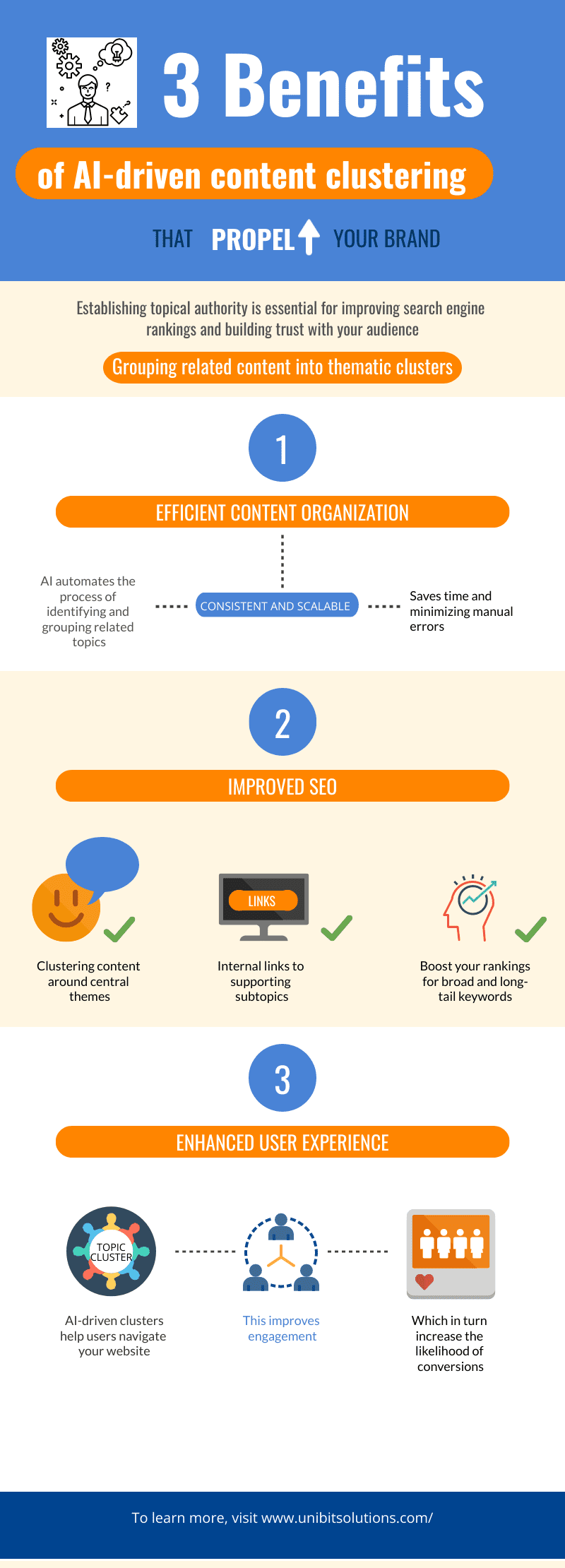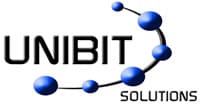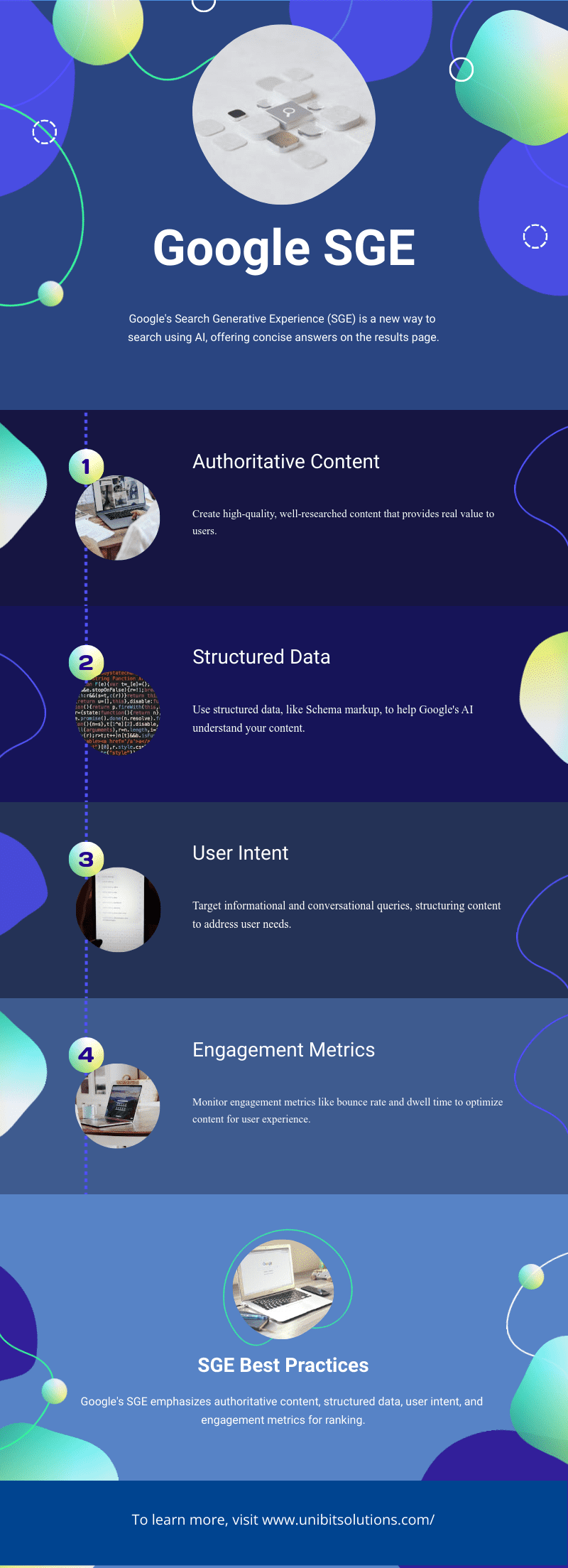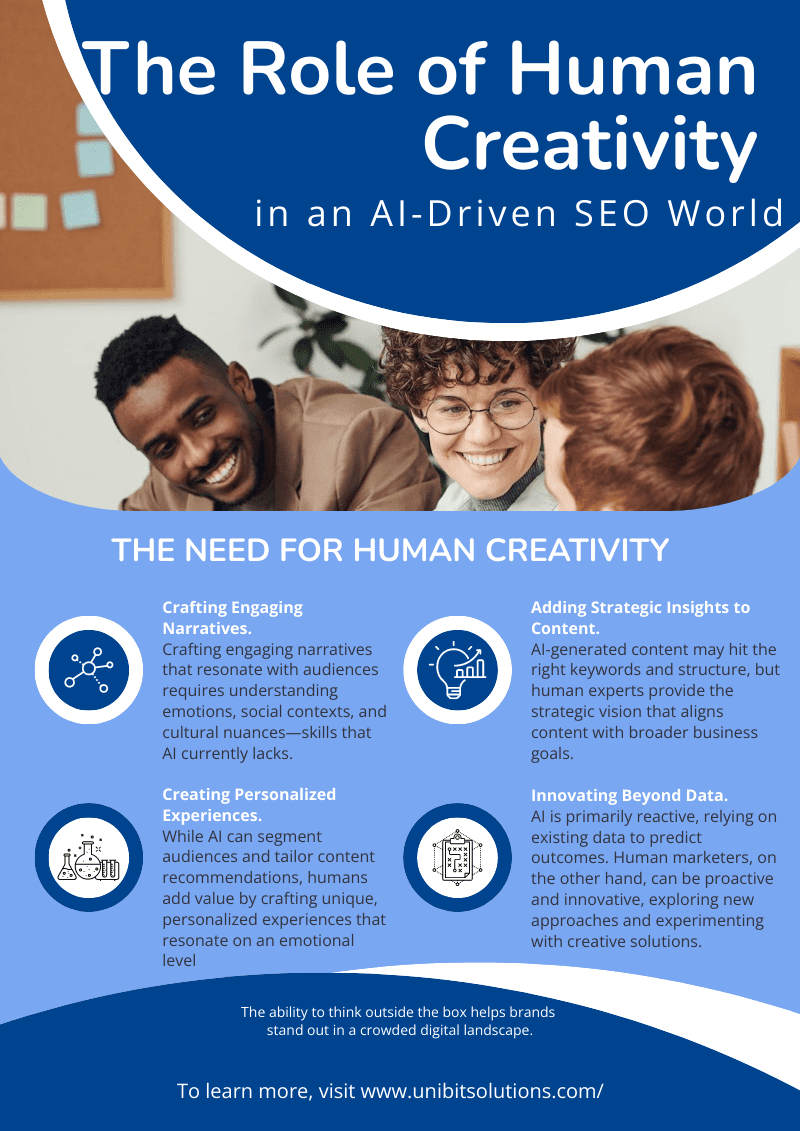AI-Driven Content Creation: Enhancing SEO Performance
Artificial intelligence (AI) is reshaping the way businesses approach content creation for search engine optimization (SEO). AI tools like ChatGPT have demonstrated the ability to generate content quickly and efficiently, which is crucial for improving SEO strategies. According to Search Engine Land, companies such as LinkedIn and Bankrate have successfully integrated AI-generated content into their SEO workflows, highlighting its effectiveness in enhancing digital performance.
One of the main advantages of AI-driven content is its speed. AI systems can create articles, headlines, and even social media posts in a fraction of the time it takes human writers. This rapid production capability allows businesses to scale their content marketing efforts while maintaining consistency in publishing schedules. For example, LinkedIn’s collaborative articles blend AI-generated drafts with expert contributions, boosting engagement and organic visibility.
Another benefit is improved keyword targeting. AI tools analyze vast amounts of online data to identify relevant keywords and phrases that resonate with search engine algorithms. By strategically placing these keywords, businesses can increase their content’s likelihood of ranking higher in search results. Bankrate’s use of AI for fact-checking and SEO optimization shows how AI-generated content can perform well if it meets quality and accuracy standards.
However, successful AI-driven SEO requires human oversight. AI can efficiently draft content, but human editors are essential to refine it for tone, clarity, and accuracy. Combining AI’s efficiency with human expertise enables businesses to maintain quality while optimizing content for search engines.
As AI continues to evolve, leveraging AI-powered tools can significantly enhance SEO performance by increasing content output, improving keyword relevance, and streamlining processes. By striking the right balance between AI efficiency and human input, businesses can stay competitive in the ever-changing digital landscape.
AI Content Generation: Speed and Quality Benefits
As we navigate a digital world brimming with information, AI-generated content is making waves in content creation. Thanks to advancements in Artificial Intelligence (AI), creating content at a pace unimaginable a decade ago has become a reality. But what are the benefits of AI-driven content for speed and quality?
AI content generation significantly boosts speed. With tools like ChatGPT or other language models, businesses can automate the creation of articles, social media posts, and product descriptions within minutes. This efficiency means companies can respond to market changes faster and publish content that keeps up with trending topics or consumer needs. For instance,
AIContentfy.com reports that with AI-powered solutions, businesses can scale up their content production by up to 50%, saving time and costs.
Beyond speed, AI also enhances quality in specific ways. By analyzing user data and understanding search intent, AI tools can optimize content with targeted keywords, improving SEO performance. This allows businesses to tailor their
digital strategy based on real-time insights and trends. Additionally, AI systems can ensure consistency in tone and messaging across multiple pieces of content, which is crucial for maintaining a cohesive brand image.
Despite these benefits, it’s essential to strike a balance. AI content lacks the nuanced creativity and emotional intelligence of human writers. For this reason, many businesses combine AI-generated drafts with human editing to refine the final output, ensuring it meets high standards and resonates with audiences.
AI for Content Consistency and Scaling

In the rapidly evolving landscape of digital marketing, creating scalable, high-quality content is essential. With Google’s heightened focus on content quality, digital marketing consultants are turning to AI to meet these standards while driving engagement and growth. As highlighted by Search Engine Land, AI can enhance your content strategy by maintaining consistency and increasing output without compromising on value. To create AI-enhanced content that resonates with your audience, follow this strategic process:
– Start by leveraging content intelligence to identify topics with the highest impact.
– Then, map your brand voice to ensure consistency across all platforms. AI-generated content can then be optimized with entities and related topics, driving relevance and discoverability.
– AI tools also streamline content distribution workflows and improve your website’s technical foundation to enhance the page experience.
– Finally, measuring performance through comprehensive analytics provides actionable insights to refine future strategies.
Aligning AI capabilities with content quality, user experience, and SEO best practices is crucial. By strategically integrating AI, you can create, optimize, and scale content efficiently while meeting Google’s quality standards.
Optimizing Keyword Research with AI-Powered Tools
Keyword research is the backbone of a successful SEO campaign, helping you reach the right audience and boost organic traffic. According to Neil Patel, integrating AI into this process can revolutionize your strategy by saving time and providing deeper insights.
AI-powered tools like Semrush, Ahrefs, and Ubersuggest can quickly analyze vast datasets to uncover hidden keyword opportunities. These tools help you predict trends, understand user intent, and generate smart keyword suggestions. By leveraging machine learning algorithms, AI dives deeper into the semantics of searches, going beyond simple word matching to offer more contextual insights.
One key advantage of using AI in keyword research is its ability to automate time-consuming tasks. AI tools can quickly generate related keywords, analyze the Search Engine Results Page (SERP), and provide sentiment insights, freeing up marketers to focus on strategy. However, it’s essential to combine AI’s findings with human expertise to create the most effective strategies. Over-reliance on AI can lead to errors or misinterpretation of data.
AI tools enhance, rather than replace, your SEO efforts. They provide comprehensive insights that allow you to refine strategies, identify gaps, and create targeted, high-impact content. In a competitive digital landscape, this blend of human insight and AI power can give your business the edge it needs.
How AI Refines Long-Tail Keyword Discovery
Long-tail keywords are essential in SEO, offering specificity that attracts targeted audiences ready to take action. However, identifying these profitable phrases can be challenging. This is where artificial intelligence (AI) steps in, revolutionizing how marketers discover and leverage long-tail keywords.
AI-powered tools utilize machine learning and natural language processing to analyze massive datasets swiftly, identifying keyword trends and gaps that might go unnoticed with traditional methods. They also provide insights into user intent, helping to pinpoint long-tail keywords that align closely with what potential customers are searching for. This strategic precision allows marketers to create content tailored to niche audiences with high conversion potential.
Moreover, AI tools like ChatGPT and Jasper AI offer creative brainstorming capabilities. These tools can generate comprehensive keyword lists based on contextual analysis, making it easier to expand on existing content strategies. By combining AI’s analytical power with human expertise, marketers can refine their keyword selection, boosting their search visibility.
Leveraging AI for Content Clustering and Topical Authority
Establishing topical authority is essential for improving search engine rankings and building trust with your audience. One effective strategy to achieve this is through content clustering, where interconnected content pieces revolve around a central theme. AI-powered tools play a pivotal role in refining this process, enhancing both efficiency and impact.
AI-powered tools, such as Keyword Insights and Outranking.io, leverage advanced algorithms like machine learning and natural language processing (NLP) to group related content into thematic clusters. This technology enables a deeper understanding of the context and intent behind each piece, making it easier to organize and interlink content. These are some of the key benefits of AI-driven content clustering:
1. Efficient Content Organization: AI automates the process of identifying and grouping related topics, saving time and minimizing manual errors. This ensures a more consistent and scalable strategy.
2. Improved SEO: Clustering content around central themes, with internal links to supporting subtopics, strengthens your website’s topical relevance in the eyes of search engines. This, in turn, boosts your rankings for broad and long-tail keywords.
3. Enhanced User Experience: AI-driven clusters help users navigate your website more easily, improving engagement and increasing the likelihood of conversions.

Navigating Google’s Search Generative Experience (SGE)
Google’s Search Generative Experience (SGE) represents a significant shift in the search landscape. This AI-driven approach to search results introduces new challenges and opportunities for businesses striving to maintain their online visibility. SGE provides concise AI-generated answers directly on the Search Engine Results Page (SERP), allowing users to find information without needing to click through to external websites. With SGE fully launched in the US and gradually rolling out to other regions, understanding this evolution is crucial for businesses wanting to stay relevant.
Adapting to Google’s AI Search Landscape
SGE relies heavily on AI models to enhance search results by pulling information from indexed content and knowledge sources. For businesses, this shift means a deeper focus on producing authoritative and user-centric content is essential. Traditional SEO principles still apply, but content now needs to be structured and optimized to meet the requirements of AI models that prioritize accuracy and relevance.
Businesses must adapt by aligning their SEO strategies with Google’s AI-enhanced algorithms. This involves refining keyword strategies to focus on longer-tail queries and leveraging structured data to make content easily accessible to Google’s algorithms. Additionally, focusing on user engagement metrics, like bounce rate and session duration, becomes even more critical, as these factors can influence how AI ranks and displays content.
Best Practices for Ranking in AI-Enhanced Search

To effectively rank in AI-enhanced search results and Google’s SGE, businesses should consider the following best practices:
1. Create Authoritative Content: Emphasize creating high-quality, well-researched content that offers real value to users. Google’s algorithms are designed to prioritize trustworthy sources, so building credibility through authoritative content is key. According to Google, the focus remains on ensuring that all AI-driven results provide users with reliable and relevant information from credible sources.
2. Use Structured Data: Implementing structured data helps Google’s AI understand and categorize your content. Schema markup, in particular, can be used to highlight specific information within a page, making it easier for Google’s AI to pull relevant insights for generative summaries.
3. Optimize for User Intent: SGE is designed to provide precise and comprehensive answers to complex queries. Therefore, it is crucial to target informational and conversational queries and structure your content in a way that quickly addresses user needs. Identifying and addressing long-tail keywords can help in capturing these more detailed search intents.
4. Monitor Engagement Metrics Regularly: Engagement metrics like bounce rate, click-through rate (CTR), and dwell time play a role in determining the relevance of your content in AI-enhanced search. Regularly monitor these metrics and optimize pages to ensure a positive user experience, which can improve your chances of being featured in AI-generated summaries.
Combining Human Expertise with AI for Optimal SEO
While AI provides data-driven insights, scalability, and efficiency, human oversight is essential to maintain creativity and strategic direction. Combining the best of both worlds ensures that SEO strategies are not only optimized for search engines but also connect meaningfully with users.
Why AI Needs Human Oversight for SEO Success
AI’s capabilities in processing massive datasets, generating content, and automating tasks have revolutionized SEO. However, relying solely on AI can lead to potential pitfalls, especially when it comes to understanding complex user behaviors and delivering nuanced content. Here’s why human oversight remains essential for effective SEO:
1. Refining AI Outputs for Quality: AI can analyze keywords, trends, and user intent, but it often falls short in understanding subtle differences in language, tone, and cultural nuances. Human intervention ensures that AI-generated content is polished, contextually accurate, and tailored to the audience.
2. Managing Complex SEO Strategies: While AI excels in automating data collection and optimizing content, it still requires human input to interpret data insights and refine SEO strategies. For example, an SEO expert can identify emerging trends, assess competitor strategies, and determine the most effective way to position a brand, all within a broader marketing context that AI might overlook.
3. Handling Evolving User Expectations: Search algorithms and user preferences are constantly evolving. AI tools are programmed based on historical data, but human oversight is needed to adjust strategies in real time, ensuring that content remains relevant and user-focused.
The Role of Human Creativity in an AI-Driven SEO World

As AI continues to become more sophisticated, the need for human creativity in SEO is more important than ever. AI tools can generate content at scale, analyze large datasets, and predict trends, but they cannot replicate the creativity and emotional intelligence that human marketers bring to the table. Here’s how human creativity complements AI in SEO:
1. Crafting Engaging Narratives: AI can generate technically accurate content, but humans excel at storytelling. Crafting engaging narratives that resonate with audiences requires understanding emotions, social contexts, and cultural nuances—skills that AI currently lacks. Marketers can use AI-generated insights to inform their narratives, but the art of storytelling is still a distinctly human capability.
2. Adding Strategic Insights to Content: AI-generated content may hit the right keywords and structure, but human experts provide the strategic vision that aligns content with broader business goals. This includes understanding brand voice, setting the right tone, and addressing customer pain points through creative and empathetic messaging.
3. Creating Personalized Experiences: Personalization is key to modern marketing. While AI can segment audiences and tailor content recommendations, humans add value by crafting unique, personalized experiences that resonate on an emotional level. This involves designing customer journeys, integrating brand narratives, and curating experiences that go beyond data-driven insights.
4. Innovating Beyond Data: AI is primarily reactive, relying on existing data to predict outcomes. Human marketers, on the other hand, can be proactive and innovative, exploring new approaches and experimenting with creative solutions. This ability to think outside the box helps brands stand out in a crowded digital landscape.
Maximizing SEO Impact with Human-AI Collaboration
To truly optimize SEO, businesses should aim for a balance where AI and human creativity complement each other. AI can automate repetitive tasks, perform complex analyses, and scale content production, freeing up marketers to focus on strategic planning, storytelling, and customer engagement.
For instance, AI tools like ChatGPT can quickly generate content drafts based on specific guidelines, while SEO experts refine and polish these drafts to align with brand messaging and strategic goals. Similarly, AI-powered analytics platforms can provide data on user behavior and search trends, enabling marketers to make informed decisions on content strategy and website optimization.
Staying Competitive with AI-Based SEO Tools and Techniques
Adopting AI-based SEO tools like Moz Pro and BrightEdge can significantly enhance a business’s ability to stay competitive in the ever-evolving search landscape. With the rise of AI applications in search engines like Google’s Gemini, Microsoft’s Bing AI, and ChatGPT, businesses now have more opportunities to optimize their SEO strategies using advanced data analytics and automation.
Connecting AI Evolution to the Generative AI and SEO Explosion
Since Alan Turing’s 1950 question, “Can machines think?”, AI has progressed from simple rule-based systems to complex neural networks and generative AI. Today’s AI, exemplified by ChatGPT, Bard, and Bing AI, is designed to replicate human-like understanding and response.
In SEO, AI started as expert systems like Google’s PageRank in 2010. Since then, developments have included neural networks and language models that enhance search accuracy. AI-powered SEO tools such as Moz Pro and BrightEdge utilize these advancements to help businesses stay ahead of changing search trends by leveraging AI’s data-driven insights.
Why Adopting AI-Based SEO Tools Is Crucial
The rise of Generative AI has reshaped how search results are displayed, with AI-driven features like Google’s Search Generative Experience (SGE) delivering more refined and interactive search results. In response, businesses must adapt to these new experiences by integrating AI-powered tools to optimize their strategies effectively.
BrightEdge:A Market Leader in AI for SEO
BrightEdge stands out as a market leader, offering an all-in-one SEO platform that harnesses AI through tools like the Data Cube and DataMind. These tools empower marketers to analyze content performance and competitor strategies, identify new keyword opportunities, and automate repetitive SEO tasks. BrightEdge Insights acts like a virtual assistant, providing strategic recommendations based on ongoing analytics.
Moz Pro: AI-Powered Keyword Research and Optimization
Similarly, Moz Pro offers AI-powered keyword research through its Keyword Explorer. This tool provides detailed metrics like keyword difficulty, monthly search volume, and organic CTR, helping businesses identify and prioritize relevant keywords. Moz Pro’s advanced algorithms also suggest long-tail keywords that align with user intent, increasing the chances of ranking higher in search results.
How to Leverage AI-Based SEO Tools Effectively
Here are our top tips to leverage AI-based SEO tools effectively:
1. Focus on User Intent and Conversational Search
AI can help identify the underlying intent behind user queries. By focusing on intent, businesses can create content that answers users’ questions more effectively. BrightEdge Instant, for example, enables marketers to analyze conversational search patterns, ensuring content aligns with the way users are searching.
2. Incorporate Structured Data and Rich Snippets
Leveraging structured data enhances the way AI reads and categorizes content. This boosts visibility in AI-generated features like Google’s SGE. Moz Pro and BrightEdge offer structured data recommendations that help businesses create content that search engines can easily interpret and rank.
3. Automate Routine SEO Tasks
Automating repetitive tasks like link audits, broken link fixes, and on-page SEO improvements saves time and resources. BrightEdge’s Autopilot can automatically detect and address these common issues, freeing up time for more strategic efforts.
4. Monitor and Optimize Engagement Metrics
AI-based tools provide insights into user behavior metrics such as dwell time, bounce rates, and page interaction. By using tools like BrightEdge Insights and Moz Pro’s analytics, businesses can continuously refine their SEO strategies based on real-time performance data.
Top AI SEO Tools for 2025
As we move into 2025, leveraging AI-powered SEO tools is essential for staying competitive in the digital space. Here are some of the top AI SEO tools that are making waves:
1.
Clearscope:
Clearscope is renowned for its AI-driven content optimization capabilities. It helps marketers and SEO professionals create highly relevant and optimized content by providing comprehensive keyword suggestions, readability analysis, and content scoring. By using natural language processing (NLP), Clearscope aligns content with user intent, ensuring that it addresses what users are actively searching for.
2.
SEMrush:
SEMrush remains a favorite among digital marketers due to its extensive features for keyword research,
competitor analysis, and backlink audits. What sets SEMrush apart is its integration of AI-driven insights, allowing users to uncover valuable long-tail keywords and monitor trends in real-time. It also offers powerful site auditing tools, which can identify technical SEO issues automatically, improving website performance and rankings.
3.
MarketMuse:
MarketMuse takes a data-driven approach to
content creation. This tool uses AI to analyze content gaps, recommending topics and keywords to enhance content relevancy and authority. MarketMuse’s advanced predictive AI suggests the best ways to target high-value keywords and understand competitive benchmarks. This means you can ensure your content covers all critical subtopics to establish topical authority effectively.
4.
Surfer SEO:
Considered the best overall AI SEO tool. Surfer SEO is a powerful on-page optimization tool that combines AI-driven insights with data analytics to help businesses create SEO-optimized content. By analyzing factors such as keyword density, content structure, and competitive benchmarks, Surfer SEO provides actionable recommendations to improve rankings and enhance search visibility.
5.
Morningscore:
Morningscore is an AI-powered SEO tool designed to simplify SEO management by providing clear, actionable insights through an intuitive interface. Its AI capabilities analyze data trends, track keyword performance, and recommend tailored strategies to boost rankings and optimize ROI.
6.
GetGenie:
GetGenie is an AI-powered content and SEO assistant that helps businesses streamline content creation and optimize for search engines. Its advanced AI capabilities generate keyword-rich content, suggest on-page improvements, and provide real-time optimization insights to enhance SEO performance effectively.
7.
INKforall:
INKforall is an AI-powered content and SEO platform designed to enhance content quality and search engine visibility. Its AI capabilities include optimizing content for readability, relevance, and keywords while providing real-time SEO suggestions to help businesses rank higher and engage audiences effectively.
8.
Jasper:
Jasper is an AI-powered content creation tool that assists in generating high-quality, SEO-friendly content tailored to specific audiences. Its advanced AI capabilities streamline writing processes, optimize keyword usage, and enhance content strategy, making it an effective solution for improving search visibility and engagement.
9.
ChatGPT:
ChatGPT is an AI-powered language model that assists with generating human-like, SEO-optimized content quickly and efficiently. Its advanced natural language processing capabilities help businesses create engaging, keyword-rich content, improve content strategies, and address user intent effectively for better search rankings.
Other AI SEO tools include:
Botify, DeepCrawl, SEO.ai, HubSpot, Outranking, Alli AI, Exploding Topics, Frase, Clearscope, and Copy.ai.
Many AI SEO tools offer free trials or limited free versions
Future Trends in AI-Powered SEO
AI-powered SEO is evolving rapidly, and several trends are emerging that will shape the future of digital marketing:
1. Predictive Analytics:
As AI models become more sophisticated, predictive analytics is set to play a critical role in SEO strategies. Predictive tools analyze historical data and identify patterns, enabling marketers to anticipate shifts in search trends and optimize content proactively. This forward-looking approach is essential for maintaining a competitive edge.
2. Voice Search Optimization:
With the increasing popularity of voice assistants like Siri, Google Assistant, and Alexa, optimizing for voice search has become crucial. AI tools are now focusing on conversational keyword research and NLP to better understand and rank voice search queries. Marketers need to adapt their content to match the more natural, question-based style of voice searches.
3. Enhanced AI Chatbots for Content Interaction:
AI chatbots are becoming more interactive and intelligent, enhancing user engagement. These chatbots are evolving to offer personalized recommendations and content navigation, significantly impacting SEO. As AI chatbots learn to interact more seamlessly with website visitors, their ability to drive traffic, conversions, and brand engagement will become a key factor in digital strategies.
How Will This Impact My Clients’ SEO Strategies?
AI is reshaping the digital marketing landscape, and AI’s impact on SEO strategies for your clients can be significant. By adopting AI-driven SEO techniques, agencies can not only improve content quality and engagement but also streamline reporting and review processes. Here’s a closer look at how AI will influence your clients’ SEO strategies:
Higher Engagement With Content
One of the primary benefits of integrating AI into your clients’ SEO strategy is the ability to create more engaging and intent-focused content. AI-powered tools, like Clearscope and MarketMuse, use advanced algorithms to analyze search intent and audience behavior, allowing agencies to optimize content for maximum engagement. These tools can suggest keyword variations, ideal content length, and even provide readability scores, all based on real-time data and user patterns.
When agencies have access to AI-generated insights, they can produce content with AI that resonates more effectively with the target audience. This results in:
– Higher User Engagement: Optimized content that matches user intent keeps visitors on the page longer and reduces bounce rates.
– Improved Click-Through Rates (CTR): AI-driven suggestions ensure that meta descriptions and titles are aligned with audience expectations, increasing CTRs in search results.
Better Conversion Rates: By focusing on relevant keywords and queries, agencies can lead visitors down a more tailored buyer’s journey, resulting in improved conversions.
Quarterly Client Approvals Instead of Monthly
The traditional model of monthly SEO reporting is often labor-intensive and can leave both clients and agencies bogged down in redundant reviews. AI-driven tools, such as SEMrush and Ahrefs, help streamline this process by automating data collection and analysis. This reduces manual workload and delivers comprehensive insights more efficiently.
With AI-enabled analytics and automated reporting, agencies can shift from monthly to quarterly client reviews without losing valuable touchpoints. Quarterly reviews are becoming more viable for several reasons:
1. Enhanced Data Accuracy: AI-based SEO tools provide real-time insights and long-term trend analyses, eliminating the need for constant manual intervention. This allows for more accurate, comprehensive reports.
2. Time for Strategic Adjustments: With quarterly reports, agencies and clients can focus on broader trends and strategic pivots rather than minor fluctuations, leading to more effective and meaningful decision-making.
3. Streamlined Client Meetings: Reduced reporting frequency means fewer meetings focused solely on metrics. Instead, agencies can concentrate on strategic discussions, creative planning, and client growth.
Conclusion: Leveraging AI for Sustainable SEO Success
Incorporating AI into SEO strategies is not just about automating tasks; it’s about enhancing human expertise to drive sustainable success. AI tools like Clearscope, SEMrush, and MarketMuse offer advanced capabilities to analyze trends, optimize content, and streamline reporting. However, the key to long-term SEO success lies in combining these AI capabilities with human creativity and strategic thinking.
AI empowers agencies to improve efficiency while still maintaining the quality and relevance of their strategies. It provides the data-driven insights necessary to make informed decisions and refine SEO tactics in real time. Yet, the human element remains critical—AI can provide recommendations, but humans bring context, empathy, and creativity to the table.
To stay competitive and achieve sustainable results, agencies should focus on:
– Harnessing AI to create more engaging and intent-focused content.
– Adopting streamlined reporting models to increase strategic efficiency.
– Combining AI insights with human expertise for a balanced and adaptable approach.
By integrating AI with human oversight, agencies can future-proof their SEO strategies, delivering measurable and sustainable success for their clients.
Here are some common FAQs about generative AI and SEO:
How Can AI Tools Improve Keyword Research?
AI tools enhance keyword research by analyzing massive datasets to identify high-traffic and relevant keywords. By leveraging natural language processing (NLP) and machine learning algorithms, AI tools can uncover keyword opportunities based on search intent and trends, helping marketers create more targeted and effective content strategies.
Can AI-Generated Content Rank Well on Google?
Yes, AI-generated content can rank well on Google if it adheres to quality guidelines. It’s crucial that AI-generated content is relevant, informative, and matches user intent. Combining AI with human oversight ensures that content meets Google’s standards for quality, accuracy, and originality, improving the chances of high rankings.
What Are Some Common AI Tools Used in SEO?
Some popular AI tools in SEO include SEMrush, Clearscope, MarketMuse, and Jasper. These tools assist with keyword research, content optimization, performance tracking, and competitive analysis, allowing businesses to streamline their SEO strategies and boost search engine visibility.
Does Using AI Mean I No Longer Need Human Writers?
No, using AI does not eliminate the need for human writers. AI can generate initial drafts, suggest keywords, and improve efficiency, but human writers are essential for adding creativity, nuance, and emotional connections that resonate with audiences.
How Does Google’s Search Generative Experience (SGE) Impact SEO?
Google’s SGE introduces AI-generated answers directly in search results, reducing the need for users to click on external links. This impacts traditional SEO by requiring businesses to create high-quality, authoritative content that can be featured in AI-generated summaries, thereby maintaining visibility.
How Can Generative AI Help With Content Clustering?
Generative AI aids in content clustering by using machine learning to analyze related topics and keywords, grouping them into cohesive clusters. This process enhances website structure, improves navigation, and boosts topical authority, which is beneficial for SEO rankings.
Are There Any Risks To Using AI-Generated Content for SEO?
The primary risk is producing low-quality or repetitive content that doesn’t add value. Additionally, AI-generated content must comply with Google’s quality guidelines. Over-relying on AI without human oversight can lead to inaccuracies or a lack of creativity.
How Does AI Affect SEO Rankings?
AI affects SEO rankings by enabling better content optimization, improved keyword targeting, and deeper insights into user intent. AI algorithms like BERT and RankBrain also influence how Google ranks content by understanding natural language and prioritizing high-quality, relevant results.
Can AI Improve Local SEO Efforts?
Yes, AI can improve local SEO by optimizing content for location-based searches, analyzing user behavior in specific regions, and suggesting localized keywords. AI tools can also track and analyze competitors’ local SEO efforts to refine strategies accordingly.
How Is AI Used in Optimizing Meta Tags and Descriptions?
AI tools analyze content to suggest optimized meta tags and descriptions based on targeted keywords, improving click-through rates (CTR). These tools can also dynamically update meta information to stay aligned with changing trends and search behaviors.
Does AI Impact Voice Search Optimization for SEO?
Yes, AI plays a crucial role in voice search optimization. AI tools help identify conversational keywords and questions, aligning content with the natural language queries users make through voice-enabled devices like Alexa and Siri.
What’s the Role of AI in Content Personalization?
AI enables content personalization by analyzing user data and preferences, suggesting tailored content based on past interactions. This increases engagement and enhances user experiences, leading to better SEO performance and higher conversion rates.
How Often Should AI-Generated Content Be Updated for SEO?
Generative AI updates for content should be done periodically to reflect the latest trends, data, and user intent. Regular updates ensure that content remains relevant and aligned with current search engine algorithms and guidelines.
How Do I Ensure My AI-Generated Content Complies With Google’s Guidelines?
To comply with Google’s guidelines, focus on quality, accuracy, and user value. Avoid keyword stuffing and ensure that AI-generated content is fact-checked, informative, and original. Combining AI with human oversight helps maintain content standards and credibility.
Need more information on the generative AI impact on SEO? Then contact Unibit Solutions today.

